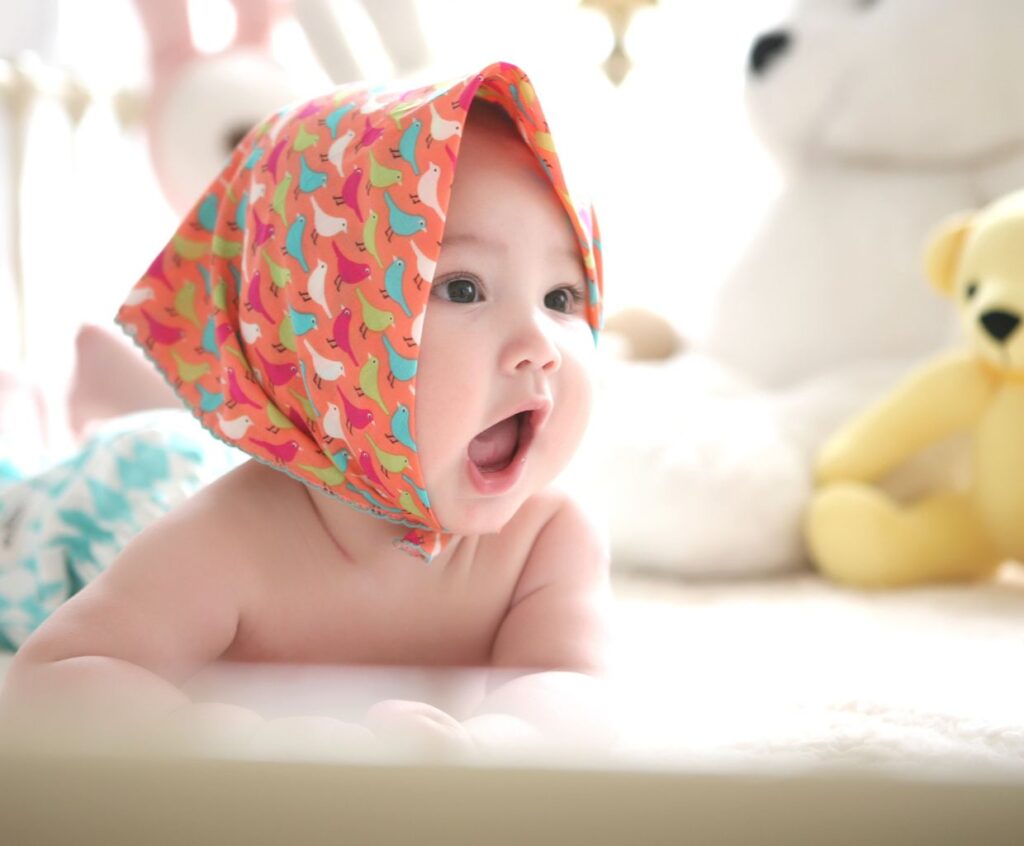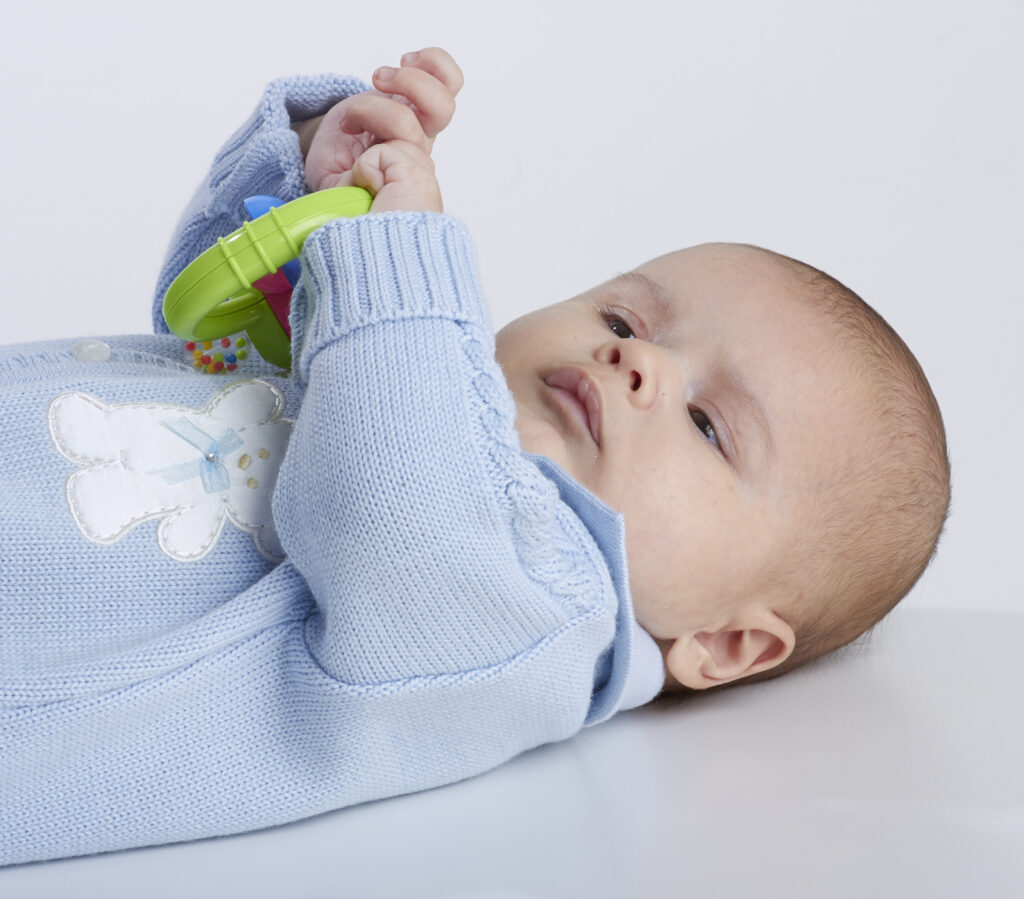Baby’s First Words: When and How Babies Begin to Talk
Every parent eagerly awaits when their little one utters their first word. It’s an exciting milestone that marks the beginning of their child’s language development journey.
While every baby is different and reaches this milestone at their own pace, there are some general patterns and stages to be aware of.

When do babies start talking?
There is a wide range of variability regarding babies’ first words. Some babies start babbling as early as six months, while others may not say their first word until closer to 14 months. Most babies, however, begin to say their first recognizable words between 9 and 12 months.
Stages of language development:
Language development in babies typically progresses through specific stages:
-
- Pre-linguistic stage: Before babies start talking, they go through a pre-linguistic stage where they communicate through cooing, babbling, and making various sounds.
-
- Babbling stage: Around 6 to 9 months, babies enter the babbling stage. They start producing repetitive syllables like “ba-ba,” “dada,” and “mama.” Although these are not words yet, they are essential to language development.
-
- First words: Between 9 and 12 months, most babies utter their first words. These words are often simple, such as “mama,” “dada,” or the names of familiar objects like “ball” or “dog.”
-
- Word explosion: Babes rapidly start expanding their vocabulary after saying their first words. They associate words with objects, actions, and people around them.
How to encourage language development:
While babies naturally develop their language skills, there are ways parents can support and encourage this development:
-
- Talk to your baby: Engage in conversations with your baby, even if they can’t respond with words. Describe your actions, point out objects, and ask simple questions.
- Read to your baby: Reading books aloud introduces them to a wide range of words and helps develop their listening skills.
- Sing and play: Singing nursery rhymes and playing interactive games like peek-a-boo can help babies develop their language skills in a fun and engaging way.
- Encourage imitation: Encourage your baby to imitate sounds, gestures, and simple words. This can help them practice their speech and language skills.
Remember, every baby is unique and will reach their language milestones in their own time. Be patient, provide a supportive environment, and enjoy the fantastic journey of watching your baby’s language skills flourish!
How can I help my baby’s language development?
There are several ways you can help promote your baby’s language development:
1. Talk to your baby: Engage in frequent conversations with them, even if they can’t respond. Narrate your daily activities, describe the objects around them, and ask them simple questions. This helps them become familiar with language patterns and vocabulary.
2. Read to your baby: Start reading to your baby from a young age. Choose age-appropriate books with colorful pictures and simple text. Point out and name the objects in the pictures, and use different tones of voice and facial expressions to make the story engaging.
3. Sing nursery rhymes and songs: Singing nursery rhymes and songs exposes your baby to different sounds and rhythms of language. It also helps develop their memory and listening skills.
4. Respond to your baby’s coos and babbles: When your baby starts making sounds, respond as if you understand what they’re saying. Mimic their sounds and build on them, creating a back-and-forth conversation. This encourages them to continue communicating and experimenting with different sounds.
5. Use gestures and facial expressions: Pairing gestures and facial expressions with words helps your baby understand the meaning behind the words. For example, you can wave goodbye while saying “bye-bye” or point to an object while saying its name.
6. Limit screen time: Excessive screen time can hinder language development. Prioritizing real-life interactions and activities that engage your baby’s senses is important.
7. Create a language-rich environment: Surround your baby with language by labeling objects, using descriptive words, and discussing what you do throughout the day. This helps them make connections between words and their meanings.
8. Play with your baby: Engage in play activities that involve language, such as playing with blocks and naming the colors or shapes or playing with dolls and engaging in pretend play.
Remember, every baby develops at their own pace, so be patient and provide a supportive environment for their language development.
Are there any signs that my baby is ready to start talking?
Yes, several signs indicate your baby is ready to start talking. Some of these signs include:
1. Babbling: Your baby may start making repetitive sounds like “ba-ba” or “mama.” This is an early form of communication and shows that they are starting to experiment with speech sounds.
2. Mimicking sounds: Your baby may imitate sounds they hear around them, such as animal noises or sirens. This shows that they are paying attention to their surroundings and trying to replicate what they hear.
3. Gesturing: Your baby may start using gestures like pointing or waving. This is a way for them to communicate their needs or interests before they can speak.
4. Understanding simple instructions: Your baby may begin to understand and follow simple instructions, such as “wave bye-bye” or “clap your hands.” This demonstrates their comprehension skills and shows they are developing the cognitive abilities necessary for language acquisition.
5. Responding to their name: Your baby may start to respond when you call their name, indicating that they are aware of their own identity and are beginning to understand the concept of language.
It’s important to remember that every child develops at their own pace so these signs may vary from baby to baby. If you have concerns about your baby’s speech development, it’s always a good idea to consult a pediatrician or speech-language pathologist for professional guidance.

